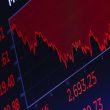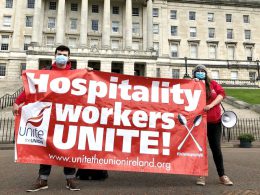By Electra Kleitsa, Xekinima (Greek Section of the CWI- the international socialist organisation to which the Socialist Party in Ireland is affiliated to)
This July, very worrying news came to light: it is estimated that since the beginning of the year, when Jair Bolsonaro took over the presidency of Brazil, the Amazon loses a forest area equal to one football field every minute. This information has now been overtaken by an even darker reality. The countless fires that have broken out in recent weeks in the rainforest are destroying extremely important ecosystems, further increasing the rate of deforestation in the Amazon.
The losses
It is not just the skies of the major cities of Brazil and other Latin American countries that have turned black with smoke.
There are terrible effects on the atmosphere, not only by the fires themselves, but also by the destruction of a forest that absorbs large amounts of carbon dioxide. The fires affect the climate of the whole region, which depends on the rainforest and on the maze of rivers and underground streams. Moreover, there is a loss of a significant part of the biodiversity of the Amazon, a diversity which is found nowhere else on the planet.
To understand the extent of the phenomenon, it is enough to know that according to an article from 2017, a new species of flora or fauna is discovered in the Amazon every two days. In the huge fires that are destroying the Amazon today, we are losing species whose existence we will never know. Some of them could potentially be useful to all humanity for their healing properties. Others may have played a key role in balancing the food chain, and their extinction will contribute to that of many others.
Attack on indigenous peoples
Beyond plants and animals, there are of course also humans. Not only the people of the whole planet and future generations who will be affected in the long term by the disaster, but also the people who live there today.
There are indigenous tribes that still live in the forest, protecting it and depending on it for their existence. Some of these tribes will disappear or disperse with the destruction of their home.
These communities are known not only for their great cultural heritage, but also for their great struggles against the devastating “growth” epidemic in the Amazon. One of the most emblematic figures in this struggle was Chico Mendes, murdered in 1988 for trying to organize indigenous people against the destruction of the rainforest that was their home and means of survival. Today, his murderers (the big agricultural and mining companies and the state that serves them) continue their destructive work by burning the Amazon.
A “disturbing” giant forest
In most cases of forest fires, it is necessary to be cautious and have concrete evidence before talking about arson, or even consciously planned fires. But in the case of the Amazon forests, which has been threatened by big business interests for decades, and especially when countless fires have broken out simultaneously in different places, it is naive to talk about “accidental events”. The bulldozers moved too slowly for the capitalist interests, so the flames conveniently came along for them and cleared the field.
But why is the Amazon destroyed? What do those who attack the heart of this “useless” forest want? Lately, oil and gold companies have been increasingly harassing the indigenous communities that protect the Amazonian forests. Big livestock companies dream of converting even more of the forest into pastures. Most of the rainforest is seen as nothing more than that: new farms and fields for grazing. But how many fields do we need on the planet? Aren’t the existing fields enough for them? After all, the destruction of the Amazon is not new, but has been going on for many decades.
Fields for single-use
No, the fields are not enough for them, because the soil of the Amazon is not made to produce soya. It is suitable for the preservation of tropical forests, but is very low in the nutrients needed for agricultural production. Thus, after one or two years of production, the “field” becomes obsolete. So the food companies will find another field, in another equally unsustainable part of the Amazon. Centuries of natural history, incalculable natural resources, cultural heritage, unmapped biodiversity, human lives are being destroyed to produce agricultural products for a year or two. This summarises the absolute absurdity of the capitalist system.
The same more or less goes for the extractive industries that have targeted the area. They want to use it to extract gold or other raw materials, leaving huge destruction behind, and taking all their profits to tax havens.
An effective employee of big business
The Brazilian president, who made it clear from the first day he came to power that the Amazonian forest is an obstacle for the large companies whose interests he serves, attributed the fires to the environmental organizations active in the region! At the same time he has given up the fate of the Amazon to the major capitalist interests that rule the world economy.
A handful of companies, controlling the oil industry, food production and the extraction of raw materials are destroying the planet in order to maximize their profits. In order to stop them we must take these giant multinationals under public ownership and democratic workers control and management.
Thus, there is only one way out of this nightmare. We need to overthrow capitalism or it will destroy the environment and human civilization as we know it.










